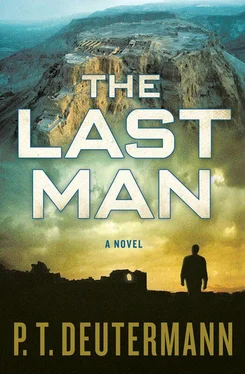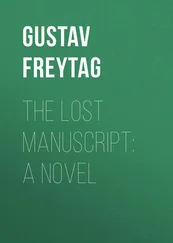“Yes, right, I understand, but I think that’s out of the question right now. You shouldn’t go back down to that depth again, and I damn sure can’t go back down that deep for a while. Besides, we need to figure out how we’re going to get out of this cave.”
Her face went crooked again. “Someone closed the entrance up above, yes?”
He looked around at the dimly lit walls of the cave. “Sure looks that way. You saw all our stuff in the cistern, and I had that slab wedged way back from the hole.”
“So someone must have known we were down here?”
“Yeah, and that’s what’s got me scared. I think someone wants us to stay down here.”
“Just like Dov,” she whispered, her eyes filling again. He pulled her over to him again, and she wept for a few minutes. He felt a wave of sympathy and had to resist the urge to kiss the top of her head. Then she took a deep breath and pulled away, wiping her eyes.
He rolled away, stood up, and began to scan the walls and the ceiling with his headlamp. Two skeletons in the mountain, he thought. One ancient, one not so ancient. A modern pipe pumping water into the cistern. A familiar-looking pipe, at that. Then he remembered the geothermal plant. The pipe coming out of that building had pointed back at the mountain. Same size. Same pipe? Was that why the young scientist had been diving into the big cistern? Or did it have something to do with those cylinders?
He was wasting time and, more importantly, air. There were two air tanks bobbing against the ceiling out there in the main cistern, but they were only partially full. Add to that what was left in their tanks here. They had three lights, all with used batteries. There was a waterproof flashlight floating up there with the tanks, but no food and no potable water, unless they went back down and looked for their water bottles. Going back down to the bottom was out of the question, and the silt on the bottom would make it impossible, anyway. He had one staging pipe and absolutely no idea of what to do next. He went back over to Judith, sat down, patted her arm, and then turned off his headlamp. She gripped his hand in the sudden darkness.
“Need to conserve the batteries,” he said. “While we think this out. The big question is, how did that guy by the altar over there get into this cave? I didn’t see any ledge or indications he came in the way we came, and there was a big boulder blocking the cave entrance when I first found it.”
She thought about it, still clutching his hand. The darkness was absolute.
“If the cistern was empty at the time of the siege, there may have been ladders up to this cave.”
“The bottom is a hundred and some feet down from the slab entrance. By my depth gauge, the entrance to this cave is at about forty feet. That’s a damn tall ladder. Plus, the entrance to the cave was sealed when I found it. No, I think there’s another way in. Up above us somewhere. And—” He stopped.
“And what?”
“Well, if there is an entrance, it must be sealed, too. Otherwise, this cave would be filled with water. Look.”
He switched on his headlamp and pointed it down at his depth gauge. It read thirty-three feet. He switched the light off. “Once I dislodged that boulder out of the entrance, the water in the cistern pressurized the air in this side cave to an equilibrium state. There’s a problem, though: If we do find a way out from this cave, when we open it, the water from the main cistern will fill this cave until the two levels are equal.”
“Why?”
“Because the pressures would have to equalize. We’re sitting in a bubble of compressed air. If we release this pressure, there’ll be a small tidal wave in here.”
“My God, all this would be lost. The writing is done in lampblack. The water out there would dissolve it all, especially what’s in those scroll holders.”
“Yeah, it might,” he said, “but what are our options? I don’t want to die here.”
She was quiet. He was aware that every breath they took was consuming precious oxygen and beginning to fill the cave with carbon dioxide. They had to do something.
“Is there no other way to lift the slab at the top of the main cistern?” she asked.
“Not from below. Even from up top, it was very, very heavy. I had to use staging pipes to lever it. That’s why I wanted those pipes — if there’s another opening, above the cave here, two of us might be able to lever it open.”
She didn’t answer. He became aware of her breathing in the silence, along with his own. He had never experienced such absolute darkness before. For a vertiginous moment he felt as if they were floating out in deep space.
“If that is — was — Dov down there,” he asked, “what do you think he was doing here? Did he ever express an interest in Metsadá?”
“Not that I recall. He’d visited, of course. Everyone comes at least once. But—”
“But?”
“The weekend before he was supposedly killed in the accident, he had gone off for a diving day with two of his college friends. They were active with LaBaG.”
“That’s the group you mentioned earlier. What is LaBaG all about?”
“LaBaG stands for Lochamim b’Sakanah Garinit — Fighters Against Nuclear Danger. They are anti nuclear everything — weapons, energy, everything. These are the people with whom he got into trouble with that protest I told you about. Oh, God, David, what is going on in this place? If that’s Dov down there—”
He nodded in the darkness. Dov had gotten across the breakers with the people who ran Israel’s nuclear program. If that was his body down there in the main cave, it meant two things: Someone had killed him and then dumped him here, or caught him here, killed him, and left him here. The same way someone had replaced the slab on them? Which brought him to the second thing, and this thought really chilled him. Did this cistern have something to do with Israel’s nuclear program?
“I hate to do it, but I’m going to climb that altar structure,” he said. “See what I can see. Can you read the writing on the wall?”
“Yes, I can. It’s Aramaic.”
“Then maybe you ought to read it, because if I succeed, it may not be there for very long.”
“Two thousand years it has been here,” she said. “We can’t endanger this.”
“Judith, we don’t have much air left. I can go get those other two Scuba tanks, assuming I can still find them, but they’re partials. After that, we start breathing CO2, and that’s the end of us.”
Ellerstein could barely see. The dust cloud being laid down by the army truck was overwhelming his own headlights. He kept glancing up at the mountain to his left, but there was only its silent black mass, against which the dust looked like a billowing curtain. He swore as his sedan banged and bumped over rocks and ruts that had probably felt the tramp of Roman sandals. Nothing changed out here.
When they pulled out onto the plateau on the west side of the fortress, he slowed to see why the truck was stopping. Once the dust blew aside, he saw the reason: There were two vehicles parked next to some old army Conex boxes. Four troopers piled out of the back of the truck and went toward the vehicles, their weapons at the ready. It looked to Ellerstein as if the vehicles were empty. Their windows were fogged over with night dew, and there was no movement showing through their windows in the glare of the truck’s high beams.
Two vehicles, he thought. The Land Rover he guessed was the American’s, but the other he recognized — it was Yehudit Ressner’s Subaru. He swore again. Whatever was going on up here, they were now both involved. His beautiful minder had gone over to the wrong side of this equation. The officer was walking back toward his car. Ellerstein rolled down the window.
Читать дальше












